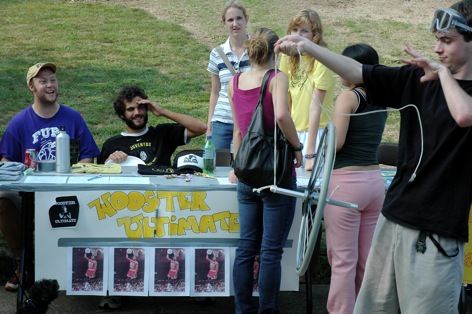
A Vibrant Community
With a long-term average of twelve majors in each class and five members of the teaching faculty, Wooster physicists participate in a diverse, vibrant, and close-knit community. In Wooster’s physics department, we support the development of each student as they become practitioners of the field, applying the perspectives and skills of a physicist in their career interests in industry, government, medicine, academia, and beyond.
From the very first year through the senior independent study experience, students have many opportunities to work closely with faculty on cutting-edge research projects, in ever-evolving areas ranging from Critical Phenomena and Quantum Optics to Chemical Physics and Reaction-Diffusion Systems. Our nationally recognized student-led Physics Club holds weekly informal Physics Table lunch gatherings with students and faculty, where more than one senior independent study project has grown out of an offhand question asked by a student about the workings of our universe! Our Physics club has an award-winning outreach program to local elementary schools, while our student-led Astronomy Club also meets weekly and is active in community outreach through regular gatherings to view astronomical bodies via our on-campus observatory.
An Integrated Curriculum
From early in a student’s career through their senior year, opportunities for joint student-faculty research in experimental, theoretical, and computational physics, as well as student work on independent projects, are intentionally integrated into our curriculum. In addition to our faculty research labs, we have dedicated laboratory spaces for each of our Introductory Physics, Modern Physics, Electronics, Computational Physics, and Junior/Senior independent study courses.
After continuing developing their experimental and scientific writing skills along with an ethical framework through our three-semester Introductory and Modern Physics Lab courses, students build on these skills by completing an independent, hands-on project in Electronics and/or Computational Physics. This leads into the Junior year, where student-driven work extends to longer-term projects in our Junior Independent Study course, culminating in the year-long senior thesis project that comprises Senior Independent Study. Beyond standard courses in Electromagnetism, Thermal Physics, and Classical and Quantum Mechanics, we also offer a diverse and rich selection of elective courses, including Astronomy, Astrophysics, General Relativity, Condensed Matter Physics, Modern Optics, Nonlinear Dynamics, and Particle Physics. The College also offers a number of Physics-Adjacent programs of study, including the Engineering Dual Degree program, a Chemical Physics major, and Teaching Licensure in Physics at the secondary school level.
Interactive Research
Opportunities for close-knit research with our faculty abound throughout a student’s time at Wooster. During the academic year, students in their first through third years may participate in paid research positions in faculty labs. Our academic curriculum intentionally prepares each student to successfully complete a year-long senior thesis project in the College’s nationally recognized Independent Study program, in which all our faculty work closely with students in a supportive environment.
Every summer since 1994, we have also run an 8 to 10 week paid summer research program, currently funded by the National Science Foundation. Students from across the U.S., including Wooster students, participate in this integrated research experience, which involves extensive workshops on scientific ethics, data analysis, and computer modeling, as well as faculty presentations of their research areas. As the program wraps up, students present their results in the form of both an oral presentation and a scientific poster session.
Mission Statement
Our physics community involves a creative and diverse group of students and faculty in a collaborative environment of learning, teaching, and research. Building on the fundamental processes of the physical world, learned in classroom and laboratory settings, students apply their skills to extend current knowledge by investigating new phenomena, and they explain their new understanding in oral presentations and written documents.
The study of physics provides a rigorous grounding in the scientific process and a firm scientific understanding of the physical world. It fosters critical thinking and provides broad practical training in scientific skills. It can lead to graduate study and basic research (in a variety of disciplines), to stimulating jobs in industry, or to challenging and rewarding careers in teaching.
Learning Goals
- Knowledge
Physics majors will be conversant with the major ideas and techniques of classical and modern physics.
- Skills
Physics majors will become proficient in mathematics, laboratory, and computer skills and problem solving.
- Communication
Physics majors will communicate their knowledge in written reports and oral and poster presentations.
- Research
Physics majors will contribute to the knowledge base of physics through research.
- Careers
Physics graduates will be able to begin physics-related careers in teaching, industry, or research.
